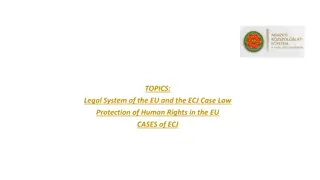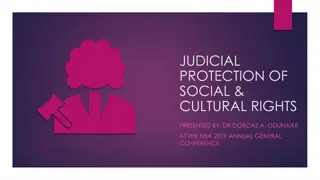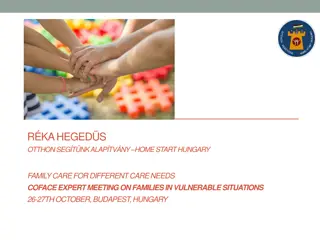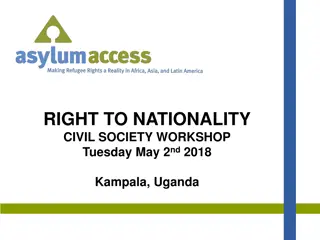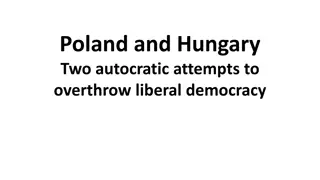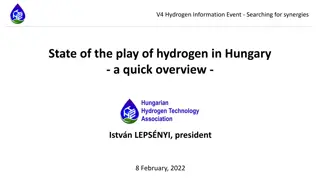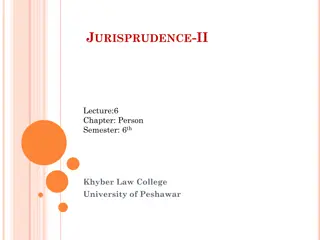Legal Framework for Protection of Nationality Rights in Hungary
The legal framework for protecting nationality rights in Hungary is outlined, detailing the historical background dating back to 1989 and the constitutional provisions that recognize national and ethnic minorities as State-constituting elements. The article explains the rights granted to minorities, such as collective participation in public life, fostering minority culture, using mother tongue, minority education, and setting up self-governments. Legislation like the Act LXXVII of 1993 further implements these constitutional provisions.
Download Presentation

Please find below an Image/Link to download the presentation.
The content on the website is provided AS IS for your information and personal use only. It may not be sold, licensed, or shared on other websites without obtaining consent from the author. Download presentation by click this link. If you encounter any issues during the download, it is possible that the publisher has removed the file from their server.
E N D
Presentation Transcript
Legal framework of the protection of nationality rights in Hungary Prof. Elisabeth S ndor-Szalay Deputy-Commissioner for Fundamental Rights Ombudsman for the Rights of National Minorities
Legal framework of the protection of nationality rights in Hungary Contents Protection of nationality rights, 1989-2012 The Fundamental Law of 2012 Act of 2011 on the Rights of Nationalities Definition of nationalities according to the law Nationality rights individual Nationality rights collective Free declaration of national identity Nationality rights and the requirement of equal treatment Prohibition of assimilation Contact with mother nations Linguistic rights use of mother tongue Nationality self-governments Parlamentary representation of nationalities The parliamentary committee of the nationalities living in Hungary The legal status of nationality advocates Nationality items on the Parliament s agenda State support for the nationalities The governmental level of dealing with nationality issues
Legal framework of the protection of nationality rights in Hungary Protection of nationality rights, 1989-2012 The protection of the rights of the nationalities living in Hungary national and ethnic minorities, according to the previous terminology dates back to the time of changing the regime in 1989. According to Article 68 para. (1) of the Constitution that had been in force until 31 December 2011, the national and ethnic minorities living in the territory of the Republic of Hungary are part of the people s power: they are State-constituting elements. acknowledged the national and ethnic minorities living in the country s territory, granting them extra minority rights to guarantee the actual equality of rights and compensate for disadvantages. Accordingly the Constitution
Legal framework of the protection of nationality rights in Hungary Protection of nationality rights, 1989-2012 Aricle 68 (2) of the Constitution listed some of these rights including the right to collective participation in public life, the right to foster minority culture, to use mother tongue, to have education in mother tongue, to use their names in their own language and to set up local and national minority self-governments. The Act LXXVII of 1993 on the rights of national and ethnic minorities (hereinafter ARM) was adopted on the basis of the Constitution for the purpose of implementing the constitutional provisions.
Legal framework of the protection of nationality rights in Hungary Protection of nationality rights, 1989-2012 It is important to note that ARM laid down the basis of a minority protection system that is exemplary on European level as well. Up till today the basic elements of this system dominate the everyday life of the 13 nationality communities acknowledged in Hungary.
Legal framework of the protection of nationality rights in Hungary The Fundamental Law of 2012 The new Fundamental Law was put into force on 1 January 2012 and it took over most of the above provisions. According to the new terminology, we use the term nationalities . The Fundamental Law provides for the protection and the special role of the nationalities living in Hungary. Just as the previous Constitution, it describes them as constituent parts of the State and parts of the political community. According to Article XXIX para. (1) of the Fundamental Law, every Hungarian citizen belonging to a nationality shall have the right to freely declare and preserve his or her identity.
Legal framework of the protection of nationality rights in Hungary The Fundamental Law of 2012 In addition, they shall have the right to use their mother tongue, to use their names in their own language individually and collectively, to foster their culture and to receive education in their mother tongues. Nationalities living in Hungary may set up local and national self- governments. (Article XXIX paragraph (2) of the Fundamental Law). According to Article 2 para. (2) of the Fundamental Law, the participation in the work of Parliament of nationalities living in Hungary shall be regulated by a cardinal Act (requiring qualified majority votes in the Parliament).
Legal framework of the protection of nationality rights in Hungary Act of 2011 on the Rights of Nationalities The rules of the Fundamental Law are detailed in the new Act CLXXIX of 2011 on the rights of nationalities (hereinafter: ARN). It replaced the former ARM, partly taking over the previous provisions with some modifications. The definition of nationality according to Section 1 para. (1) of ARN: all ethnic groups are nationalities which are - resident in Hungary for at least one century, - they are in numerical minority amongst the population of the State, - they are distinguished from the rest of the population by their own language, culture and traditions and - they manifest a sense of cohesion that is aimed at the preservation of these and at the expression and protection of the interests of their historically established communities.
Legal framework of the protection of nationality rights in Hungary Definition of nationalities according to the law The nationalities under paragraph (1) are listed in Appendix No. 1. to the Act (this is a taxative list and adding a new nationality to the list is subject to a special procedure to be detailed later on) The 13 acknowledged nationalities in Hungary are, according to the law: Bulgarian, Greek, Croatian, Polish, German, Armenian, Roma, Romania, Ruthenian, Serbian, Slovak, Slovene and Ukrainian. According to Section 148 of ARN, if a nationality other than those listed in Appendix No. 1 wishes to verify that they meet the relevant conditions, minimum one thousand electors forming part of that nationality may initiate that the nationality be declared an ethnic group native to Hungary.
Legal framework of the protection of nationality rights in Hungary Definition of nationalities according to the law The relevant signature collection forms shall be submitted to the Chair of the National Election Committee. The procedure shall be governed by the provisions of the Act relating to the initiation of national referenda. In the course of its procedure, the National Election Committee shall seek the position of the President of the Hungarian Academy of Sciences with respect to the existence of the statutory conditions. Since 2011 the President of the Hungarian Academy of Sciences has not supported the inclusion of any further nationality community to the list of acknowledged nationalities.
Legal framework of the protection of nationality rights in Hungary Nationality rights individual ANR provides for the details of the individual and by derogation from international standards also the collective rights of the nationalities. According to ANR, the persons belonging to the nationalities living in Hungary are entitled to (individual rights): honour the nationality traditions relating to the family; foster their family relations; conduct their family celebrations in their mother tongue and conducting of the church ceremonies in their mother tongue; use their surnames and first names in their mother tongue and have the right to seek the official recognition of their surnames and first names; Continued on next page
Legal framework of the protection of nationality rights in Hungary Nationality rights individual select their own and their children s first names in accordance with their own nationality and to have them registered in accordance with the rules of the language of their nationality. In the case of registration in non-Latin writing, it is compulsory to also use phonetic transcription in Latin letters; freely use his mother tongue verbally and in writing, to acquaint himself with, foster, enrich and pass on his history, culture and traditions; to learn his mother tongue, to attend public education, education and cultural heritage events in his mother tongue; to equal opportunities in education and to cultural services which the State shall promote with effective measures; the protection of his personal data related to his nationality affiliation as set forth in a separate rule of law.
Legal framework of the protection of nationality rights in Hungary Nationality rights collective Collective rights are the ones not only linked to the individual but to the community. These include in particular the following rights to preserve, foster, reinforce and pass on their identity; to preserve and develop their historical traditions and mother tongue and to foster and enrich their material and spiritual culture; to use historically established locality names, street names and other geographical designations intended for the community; to establish and operate institutions and to take over institutions from other agencies within the statutory boundaries; to kindergarten education, elementary education, nationality boarding services, secondary and grammar school education, vocational education and higher education, and are further entitled Continued on next page
Legal framework of the protection of nationality rights in Hungary Nationality rights collective to supplementary nationality education by way of their nationality self- government with nation-wide competence and to participate in the formulation thereof; to conduct their events and ceremonies undisturbed; to preserve, foster and pass on their architectural, cultural, reverential and religious memories and traditions and to use their symbols. to set up associations, local and national self-governments; to the preparation and the broadcasting of regular nationality programs in the public service media; to have representation in the National Assembly (Parliament) initiate the establishment of the conditions necessary for Nationality organisations have the right to establish and maintain wide- ranging and direct international relations. In addition to the above, ANR also contains the provisions on self-government in nationality education and culture, the rights of nationalities in providing media content, the details of setting up and operating nationality self- governments and the financial basis of performing nationality public affairs.
Legal framework of the protection of nationality rights in Hungary Free declaration of national identity The right to freely declare and preserve national identity as enshrined in the Fundamental Law is presented in Section 3 of ANR stating that every nationality has the right to exist and to survive as a nationality community This is based on the principle of the free confession of one s identity. According to Section 11 of ANR, declaring affiliation with a nationality is the individual s exclusive and inalienable right. No one may be obliged to make a declaration on the issue of affiliation with a nationality, however, a rule of law or a legal rule issued for the implementation thereof may tie the exercise of certain nationality rights to the individual s declaration.
Legal framework of the protection of nationality rights in Hungary Free declaration of national identity The right to a nationality identity and the declaration of affiliation with a nationality do not exclude the recognition of double or multiple affiliations, except as set forth in the Act. Declaring one s national identity is a decision to be made solely by the individual! One may freely decide to confess or be silent about his or her national identity. The State shall not interfere in this issue and the State may not classify anyone into one or another nationality. Nor can the State oblige anyone to declare his/her nationality. The Constitutional Court of Hungary also addressed the question of the free declaration of identity in the Decision No. 45/2005. (XII. 14.) AB. The Court held that it was a constitutional right rooted in the fundamental rights to human dignity and the protection of privacy.
Legal framework of the protection of nationality rights in Hungary Free declaration of national identity As a regulation connected to the free declaration of identity, Section 13 para. (1) of ANR provides that it is the right of individuals belonging to a nationality to voluntarily and anonymously declare their affiliation with a nationality in the course of official statistical data gathering, such as the national census. Special data relating to affiliation with a nationality may be managed for the purposes of the determination of state aid provided with regard to affiliation with a nationality. As the identification with a nationality comes with the restriction of the right to identity, it can only be done in a proportionate manner, when it is absolutely necessary.
Legal framework of the protection of nationality rights in Hungary Nationality rights and the requirement of equal treatment It is an obligation of the State to grant equal treatment and any negative discrimination is prohibited as enshrined in Article XV of the Fundamental Law. Accordingly, Hungary shall guarantee the fundamental rights to everyone without any discrimination, in particular on grounds of race, colour, sex, disability, language, religion, political or other opinion, national or social origin, property, birth or any other status. According to Section 7 of ANR, it is forbidden to violate the requirement of equal treatment in any way on account of affiliation with a nationality.
Legal framework of the protection of nationality rights in Hungary Prohibition of assimilation In addition (in Article 9 of ANR), Hungary forbids all policies and practices which a) are aimed at or result in the assimilation of nationalities into the majority nation or the exclusion and segregation of nationalities from the majority nation, b) are aimed at the alteration of the national or ethnic conditions of areas inhabited by nationalities, c) persecute or intimidate a nationality or individuals belonging to a nationality due to their affiliation, make their living conditions more cumbersome or prevent them from the exercise of their rights, or d) are aimed at the forced removal or relocation of a nationality.
Legal framework of the protection of nationality rights in Hungary Prohibition of assimilation Hungary shall take firm action in its international relations against all political endeavours consequences listed on the previous slide. that may lead to the Hungary shall also attempt to provide protection against such policies by relying on the means afforded by international law and by virtue of international conventions.
Legal framework of the protection of nationality rights in Hungary Contact with mother nations ANR guarantees the right of the nationalities to keep contacts with their mother nations. Every nationality community and every individual belonging to a nationality has the right a) to prosperity in their land of birth and to the freedom and protection of their own culture and traditions and those of the birth place or place of residence of their parents and ancestors; b) to the maintenance of undisturbed contact with their home country. Individuals belonging to a nationality have the right to maintain contact both with the state and communal institutions of the home country and language nations and with nationalities living in other countries. Accordingly this right is formed both as an individual and a collective right. It is important to note that Hungary has concluded bilateral agreements with all neighbouring countries that mutually guarantee the right to maintain contacts between the nationality communities and their mother countries.
Legal framework of the protection of nationality rights in Hungary Linguistic rights use of mother tongue The right to use one s mother tongue enshrined in the Fundamental Law may be enjoyed by members of nationality communities both in their private life and in their contacts with the public authorities. Although one s private life usually lies beyond the scope of legal regulation, Section 15 of ARN contains explicit provisions on honouring the nationality traditions relating to the family, fostering family relations and conducting nationalities mother tongues, as well as on the right to conduct church ceremonies related thereto in their mother tongue. family celebrations in the
Legal framework of the protection of nationality rights in Hungary Linguistic rights use of mother tongue With regard to maintaining contacts with the public authority, according to Section 5 of ARN, the use of the mother tongue in civil and criminal proceedings as well as in public administration proceedings is ensured by the relevant procedural laws. Thus, in the court proceedings the use of one s mother tongue is granted in Section 6 (2) of the Act III of 1952 on the Civil Procedure and in Section 9 (2) of the Act XIX of 1998 on Criminal Proceedings. The use of one s mother tongue in public administration proceedings is guaranteed in Section 9 of the Act CXL of 2004 on the General Rules of Public Administration Procedure. Members of Parliament who belong to a nationality community and Nationality Advocates (I shall give details of this institution later on) may use their mother tongue in the Parliament and in local governments.
Legal frameworkof the protection of nationality rights in Hungary Linguistic rights use of mother tongue The right to use names in their own language as a right granted in the Fundamental Law is both an individual and a community right, detailed in ARN. [Already mentioned on previous slides: right to use their surnames and first names in their mother tongue / right to select their own and their children s first names / transcription] On request, the identity card shall also state the name of the individual belonging to a nationality in the language of his nationality, as recorded in the birth certificate. A legal rule may also permit the use of the name of the individual belonging to a nationality in the language of his nationality, as recorded in the birth certificate, in other official documents. The detailed procedural rules on individually using nationality names can be found in Act I of 2010 on Registration Procedure.
Legal framework of the protection of nationality rights in Hungary Linguistic rights use of mother tongue Section 18 of ARN provides that, as collective right, in exercising their rights attached to the use of communal names, nationalities have the right to use historically established locality names, street names and other geographical designations intended for the community. According to Section 6, in localities where the ratio, as registered in the census, of a nationality reaches 20%, at the request of the local nationality self-government concerned, in filling the positions of local civil servants and public sector employees as well as the positions of notary public and court bailiff, a person familiar with the mother tongue of the given nationality shall also be employed, subject to the observance of the general professional requirements.
Legal framework of the protection of nationality rights in Hungary Linguistic rights use of mother tongue In localities where the ratio, as registered in the census, of a nationality reaches 10% and there is a nationality self- government or nationality association in the locality, at the request of the local nationality self-government or nationality association concerned, the media service provider operated or financed by the local municipality shall provide regular nationality public service programmes in the interest of keeping the nationality community living in the given locality informed in their mother tongue. This provision shall also apply to press products published or financed by local municipalities. (Section 6 (3) of ARN)
Legal framework of the protection of nationality rights in Hungary Nationality self-governments Collective participation in public life, guaranteed for nationality communities, is partly realised through the establishment of nationality self-governments. According to Section 2 of ARN: Nationality self-government is an organisation established on the basis of this Act by way of democratic elections that operates as a legal entity, in the form of a body, fulfils nationality public service duties as defined by law and is established for the enforcement of the rights of nationality communities, the protection and representation of the interests of nationalities and the independent administration of the nationality public affairs falling into its scope of responsibilities and competence at a local, regional or national level.
Legal framework of the protection of nationality rights in Hungary Nationality self-governments In Hungary, the system of nationality self-governments is based on the personal principle, serving the primary aim of realising the cultural autonomy of the nationalities and providing a structural framework for the realisation of such cultural autonomy. According to Section 10 of ARN, the fundamental duty of nationality self-governments is to protect and represent the interests of nationalities by exercising the responsibilities and powers of nationality self-governments.
Legal framework of the protection of nationality rights in Hungary Parlamentary representation of nationalities The Fundamental Law guarantees the participation of the nationalities in the work of the National Assembly (Parliament of Hungary). Article 2 (2) of the Fundamental Law: The participation in the work of Parliament of nationalities living in Hungary shall be regulated by a cardinal Act. (2/3 majority) Act CCIII of 2011 on the Election of the Members of Parliament (AEP) regulates the conditions of the representation and the participation of the nationalities in the work of the Parliament. In essence these regulations provide for the conditions of obtaining a preferential parliamentary mandate. If these conditions are fulfilled, the candidates on the nationality list may win a mandate and the full scale of rights as MP to represent their own nationality in the Parliament. The rules of AEP provide additional benefits and rights for the nationalities that set up a nationality list at the elections but do not win any preferential mandate.
Legal framework of the protection of nationality rights in Hungary Parlamentary representation of nationalities According to Section 18 of AEP, the nationalities that do not win a preferential mandate of MP shall have a nationality advocate to represent them in the Parliament. At the parliamentary elections of 2018 all the 13 nationalities had the possibility to participate in the elections, and as a result, today there is one (German) MP with a preferential mandate and there are 12 nationality advocates in the Parliament.
Legal framework of the protection of nationality rights in Hungary The parliamentary committee of the nationalities living in Hungary According to the Act XXXVI of 2012 on the National Assembly, the Parliament shall set up a committee representing the nationalities in Hungary. The members of the committee are the MPs obtaining mandate from a nationality list, and the nationality advocates. This committee is an organ of the National Assembly acting in the field of the interests and rights of nationalities, in charge of putting forward initiatives, making proposals, delivering opinions, and contributing to supervising the work of the Government.
Legal framework of the protection of nationality rights in Hungary The parliamentary committee of the nationalities living in Hungary The committee representing the nationalities shall take a position on the report prepared by the Government on the state of the nationalities, and on the annual report of the Commissioner for Fundamental Rights. The committee may discuss, at the request of the National Assembly or in its discretion, any question concerning its functions, and may take a position on it.
Legal framework of the protection of nationality rights in Hungary The legal status of nationality advocates They shall have equal rights and obligations, they shall perform their activities in the interest of the public and the nationality concerned, and they shall not be given instructions in that respect. The nationality advocate may speak at the sitting of the National Assembly if the House Committee considers that the item on the orders of the day affects the interests or rights of nationalities. The nationality advocate shall have no right to vote at the sittings of the National Assembly. The nationality advocate shall participate with a right to vote in the work of the committee representing the nationalities, and he or she may be authorized to attend, in a consultative capacity, the sittings of the standing committees or of the committee on legislation.
Legal framework of the protection of nationality rights in Hungary The legal status of nationality advocates The nationality advocate may address questions to the Government, the member of the Government, the Commissioner for Fundamental Rights, the President of the State Audit Office and the Prosecutor General about matters within their functions and affecting the interests or rights of nationalities Nationality advocates have the right and the obligation to participate in a proactive manner in the work of the National Assembly. The Member shall be obliged to attend the sittings of the National Assembly and of the committee he or she is the member of. The MPs belonging to a nationality, the Members obtaining mandate from a nationality list, and the nationality advocate may speak in their mother tongue and may submit papers in their mother tongue.
Legal framework of the protection of nationality rights in Hungary Nationality items on the Parliament s agenda Classification of questions as nationality items on the agenda The MPs belonging to a nationality, the Members obtaining mandate from a nationality list, and the nationality advocate may speak in the House when the given item on the agenda is classified as a nationality item on the agenda . It is the right of the House Committee to draw up a proposal on the items of the agenda and specify the items affecting the interests or rights of nationalities. The House Committee shall take its decision unanimously. In the absence of a unanimous decision, the question shall be decided by the Speaker of the House.
Legal framework of the protection of nationality rights in Hungary Nationality items on the Parliament s agenda The chair of the committee representing the nationalities may initiate with the Speaker the convening of the House Committee in the interest of the House Committee identifying an item on the agenda of the day as an item affecting the interests or rights of nationalities. The Speaker shall decide on convening the House Committee. It is important to note that the Fundamental Law itself grants some rights to the committee. According to Article S and Article 6 (1), any parliamentary committee (including the committee representing the nationalities) may submit a proposal for the adoption of a new Fundamental Law or for any amendment of the Fundamental Law or it may propose bills (draft legislation).
Legal framework of the protection of nationality rights in Hungary State support for the nationalities The Hungarian State provides support in many forms for the nationality communities, the operation of their self-governments, the performance of their duties and the wide scope of instititutional framework implementing their cultural autonomy. According to Section 126 of ARN, Nationality self-governments have the following sources of funding in particular: funding from the State s central budget; other support; own income, revenues from business activities; proceeds of its assets; donations from mother countries and other donations; funds taken over.
Legal framework of the protection of nationality rights in Hungary State support for the nationalities Additionally, the State provides support to the extent regulated in the Act of the Central Budget for the nationality self-governments for performing public duties related to the nationalities in the framework of a task-financing system; acticvities and projects realised in the framework of the nationalities educational and cultural self-management, nationality cultural autonomy; the development of the nationalities cultural autonomy for nationality organisations within and outside the system of state finances.
Legal framework of the protection of nationality rights in Hungary The governmental level of dealing with nationality issues The central implementing governmental organisation dealing with nationalities is the State Secretariate for Church, Nationality and Civil Society Relations within the Ministry of Human Capacities. In the framework of nationality-policy, the Minister of State shall coordinate the strategic aspects of nationality-policy and nation-policy and it may initiate the submission of a petition to the National Assembly on dissolving any nationality self-government that operates in breach of the Fundamental Law (unconstitutional operation). According to Article 129 of ARN, nationality self-governments may take part in the State and European Union tenders invited within the realm of nationality educational and cultural self-administration and nationality cultural autonomy under the same terms and conditions as local municipalities. This widens the possibilities for financing of nationality self-governments.
Legal framework of the protection of nationality rights in Hungary






